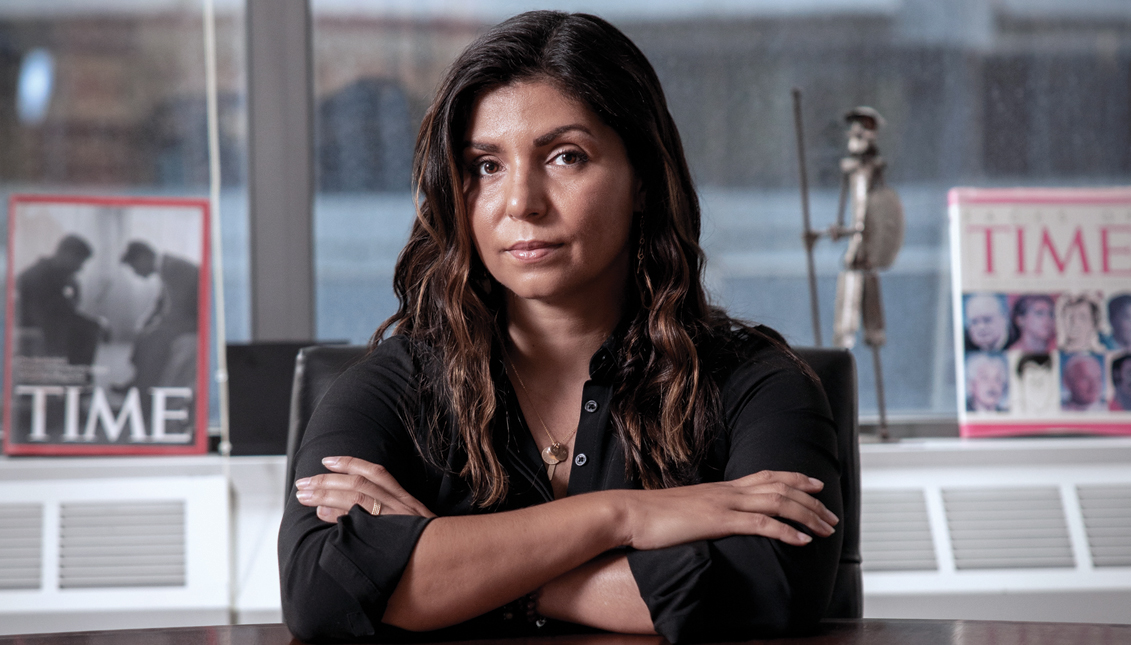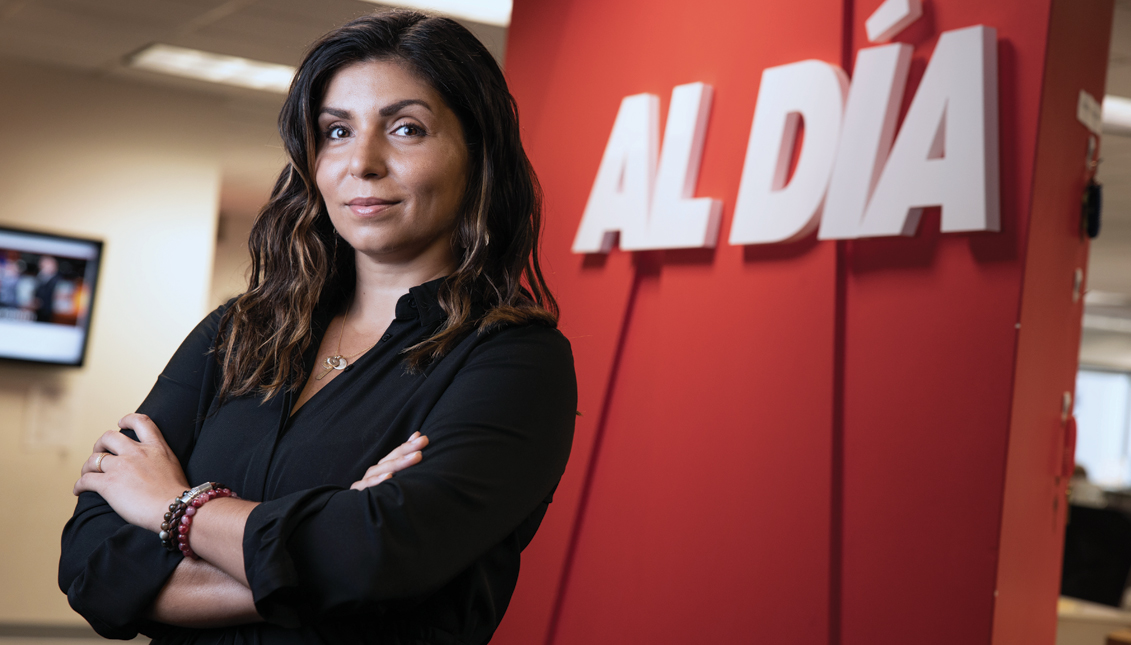
Carolina Cabrera DiGiorgio, Congreso's Vital Cog
Ever since Carolina Cabrera DiGiorgio took the helm, the longtime nonprofit supporting Philly's Latinx community has reached new heights.
Carolina Cabrera DiGiorgio's first memory of the United States of America is getting lost in the Miami airport when she immigrated with her parents at five years old.
"I ran into the elevator ahead of my family, and the doors closed, and so I was in the elevator alone, and as the doors opened again, I was on a different floor," she said.
A man stood with the young Carolina until her mom found her.
That day, the family was on their way to New Jersey from Honduras to start a new life.
They were leaving behind their home country, where Cabrera DiGiorgio said she had many "great memories" featuring the family's quaint, blue house, their dog, and grandparents who were very close with their grandchildren.
"Just a very, very happy start," said Cabrera DiGiorgio.
But as a young child, those memories and experiences aren't as impactful. Cabrera DiGiorgio said it took her until she became a mother herself that she realized the sacrifices made by her parents to come to a new country.
"My mom and dad, Gaspar and Brenda, are just two of the most amazing and courageous individuals," said Cabrera DiGiorgio.
Her parents left behind their roots, professions, friends, and day-to-day contact with family in an age without social media.
"They recognized the opportunity of the American dream, and they believed in it," said Cabrera DiGiorgio.
Part of their decision to immigrate was also rooted in their past struggles, which instilled a drive for self-improvement through hard work and education.
Gaspar and Brenda instilled that same drive in their three children upon coming to the U.S.
"A lot of my takeaways are the hard work and education, and the love and the commitment to our family, but also to America for providing us with this really amazing opportunity to thrive and succeed," said Cabrera DiGiorgio.
The family settled first in an apartment in Voorhees, New Jersey, for a couple years before moving to a house in Gloucester County.
Growing up in the U.S., school was the most important thing in the Cabrera household because it represented the gateway to more opportunity.
"We all went to public school in South Jersey, and my parents made sure that we recognized what a great education we had," said Cabrera DiGiorgio.
Back in Honduras, Gaspar was an engineer and Brenda an attorney before immigrating. Cabrera DiGiorgio's mom would also go back to school to get a Master's degree in social work after settling in South Jersey.
For the most part, their three kids would follow in their footsteps when it came to career paths.
Cabrera DiGiorgio would follow her mother's example and become a lawyer, getting her bachelor's and law degrees from Rutgers.
In addition to her mom's influence, as a political science undergrad, Cabrera DiGiorgio also developed a fascination for how the law interacted with different facets of society.
"I really liked the dynamic of the community, the government, how they interfaced with one another," she said.
After law school, Cabrera DiGiorgio completed an appellate court fellowship with Judge George Seltzer in New Jersey before joining Stradley Ronon, a Philadelphia firm.
There, she was part of the firm's business division and worked on cases dealing with real estate, finance, corporations, banking, and nonprofit governance.
"For about the next decade of my life, I learned a lot: how to be a quick thinker, how to be very analytical, made a lot of great friends and relationships," said Cabrera DiGiorgio.

Speaking of relationships, she said her time at Stradley Ronon was what first introduced her to many of the Latinx professionals and organizations in Philadelphia.
One of the organizations she would get to know best was Congreso de Latinos Unidos.
The North Philly-based nonprofit organization has been a resource hub for Latinx individuals in the surrounding community for more than 40 years in health, social services, education, and more.
Cabrera DiGiorgio would join the board of the organization in 2009.
Before she was named Congreso's CEO, Cabrera DiGiorgio took a role in 2015 at the recommendation of then-Chairman of the Montgomery County Board of Commissioners Josh Shapiro as the county's director of commerce.
Shapiro's vision for the new department of commerce was to provide more support for the business community of Montgomery County and put more emphasis on workforce development.
"I was really excited," said Cabrera DiGiorgio. "It was my first opportunity to sort of lead a department, to create something new, and be a part of the vision."
In the two years she was director, the new Montgomery County Department of Commerce created a loan program to provide financing for businesses and organizations in the county. It also helped companies with marketing and advertising aspects and made talent pipelines to the manufacturing sector through a re-entry project in partnership with Montco prisons.
In 2017, after eight years on Congreso's board and rising to its chair position, the CEO position opened up at the organization.
"I was going for it," said Cabrera DiGiorgio. "It was something I was very passionate about. I had fallen in love with the mission and community that Congreso serves."
RELATED CONTENT
For her, the organization's role was about understanding what poverty looks like in America, which she admitted was a new thing for her.
"As a young adult, I felt like I understood it in Honduras, I had seen it. And yet, this was really the first time it was visible to me in our neighborhoods in Philadelphia," said Cabrera DiGiorgio.
When delving more into the community served by Congreso, she said she admires its "strength and resilience."
"This is a community that wants the best for their children, their families, just like my parents did," said Cabrera DiGiorgio. "They are vibrant, they are diverse, they are unified, and they are strong."
A year into her time as CEO, Congreso conducted an internal review of its services and found that the families it was meant to serve were being reached too late by the organization to have a meaningful impact.
"That's what drove our vision to start earlier in time," said Cabrera DiGiorgio. "The early childhood, womb-to-work platform was really rooted in the idea that we needed to access children, families, individuals at an earlier point in time to provide long-term support."
Before the review, Congreso had maintained some early childhood programs, but for the parents of young kids and not the kids themselves.
"All of the science supports the idea that those early childhood years are really critical for the development of an individual," said Cabrera DiGiorgio.
Some new catered programs deal with everything from housing insecurity and early childhood care (daycare) to ensuring proper medical services are available to children.
"The idea for our new platform has been to really work with the family holistically so everyone in that household would be provided with support," said Cabrera DiGiorgio. "We are looking at a household as a whole."
She said programs are still evolving and being created to further meet their outcome goals for community members.
Beyond the shift in services, Cabrera DiGiorgio said she was proud of helping Congreso become financially stable for the first time in a long time and for its selection as a top workplace in Philadelphia for the last three years.
Amid coronavirus, she said she was also proud of Congreso's response to the pandemic as it shut down Philadelphia.
The organization was well-prepared to go virtual for the employees who couldn't come in during the lockdown and effectively transitioned its medical services to connect to virtual platforms.
Most of its programming also went virtual and is now often held through Zoom.
"By the time the Governor announced the original lockdown day… we had been talking about it, we had been prepared," said Cabrera DiGiorgio. "That sounds like it was easy, [but] it certainly wasn't easy and didn't come without challenges."
Despite the challenges, she applauded the staff's effort to continue the organization's commitment to serving the community, whether it be educational or health services.
As a result of its sound financial footing, the organization has also not had to lay off anyone amid COVID-19's economic downturn, according to Cabrera DiGiorgio.
Before and during these crazy times, her leadership is why she has been named AL DÍA's nonprofit archetype for its Hispanic Heritage Awards.
When asked her advice for the next generation of nonprofit leaders, Cabrera DiGiorgio kept it simple: honesty and positivity are the keys.
"Be really honest with the word that you use, try to instill positivity in all that you do, making sure you are using your influence in a positive way," she said.











LEAVE A COMMENT:
Join the discussion! Leave a comment.